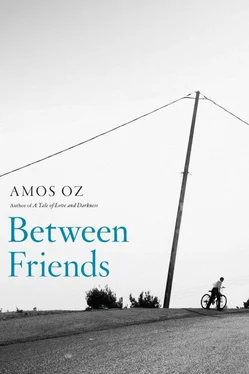The bus had already left Tel Aviv and was driving jerkily from town to town, pulling up at every stop, letting passengers on and off, hard-working people who spoke Romanian, Arabic, Yiddish, Hungarian, some carrying live chickens or large bundles wrapped in tattered blankets or old suitcases tied with ropes. When shouting and pushing occasionally broke out on the bus, the driver rebuked the passengers and they cursed him. At one point, the driver stopped on the side of the road between two small villages, got off, stood with his back to the bus, and urinated in a field. When he boarded again and started the engine, a murky cloud of stinking diesel fuel filled the air. It was hot and humid, and the passengers were bathed in sweat. The trip was very long, even longer than the ride from Kibbutz Yekhat to Tel Aviv, because the bus circled through the small towns and an immigrant camp. Citrus groves and fields of thorns filled the unpopulated areas. Dusty cypress or eucalyptus trees with peeling bark lined the sides of the road. Finally, when day began to soften into evening, Moshe stood up, pulled the cord to stop the bus, and stepped off onto the fork in the dirt road that led to the hospital.
The moment he got off the bus, Moshe saw a small mongrel puppy, gray-brown with white patches on its head. It was running diagonally through the bushes toward the road, which it crossed just as the bus began to move. The front tire missed it, but the back one crushed the creature before it even had a chance to bark. There was only a light thump and the bus continued on its way. The little dog’s body lay on the cracked road, still twitching violently, raising its head again and again and banging it on the hard asphalt each time it fell back. Its legs flailed in the air and a stream of dark blood spurted from the open jaw past the small, shiny teeth, and another trickle of blood oozed from its hindquarters. Moshe ran over, kneeled on the road, and held the dog’s head gently until it stopped twitching and its eyes glazed over. Then he picked up the small, still-warm body so that no other cars would run over it and carried it in his arms to the foot of a eucalyptus tree with a whitewashed trunk near the bus stop and laid it down. He cleaned his hands with some dirt but couldn’t wipe the bloodstains off his trousers and white Sabbath shirt. He knew his father was not likely to notice them. There were very few things his father still noticed. Moshe stood there for a moment, took out a handkerchief, and wiped the moisture off his glasses; then, since night was falling, he began to walk quickly, almost running along the dirt road.
The hospital, a twenty-minute walk from the road, was surrounded by a wall of untreated cinder blocks topped with barbed wire. By the time he reached it, the blood on his clothes had congealed into rust-colored stains.
A fat, sweaty guard wearing a yarmulke stood at the hospital gate, blocking the entrance with his thick body. He told Moshe that visiting hours were over a long time ago and he should “go and come back tomorrow.” Moshe, his eyes still filled with tears for the dead dog, tried to explain that he’d come all the way from Kibbutz Yekhat to see his father, and he had to be back at school on the kibbutz by seven o’clock tomorrow morning. The fat guard, who was in a jovial mood, pointed to the black beret on Moshe’s head and said, “They don’t keep the Sabbath on the kibbutz and they eat treyf there, don’t they?” Moshe tried to explain, but the tears choked him. The guard softened and said, “Don’t cry, son, go in, it’s okay, go in, but next time, come between four and five, not at night. And don’t stay more than half an hour.” Moshe thanked him and, for some reason, reached out to shake the guard’s hand. The guard didn’t take the proffered hand, but tapped the black beret on the young boy’s head twice and said, “Just make sure you keep the Sabbath.”
Moshe crossed a small, neglected garden with two benches badly in need of fresh paint and walked through the iron-barred door that opened when he rang a raspy bell. In the entrance hall, some ten men and women were sitting on metal chairs that lined the walls, which were painted a sort of khaki color to halfway up. The men and women were all wearing striped hospital gowns and flat slippers. Some were speaking to each other in hesitant voices. The supervisor, a strapping fellow wearing a loud flowered shirt and army-issue trousers and boots, was standing in a corner of the room chewing gum. An older woman was knitting furiously, though she had neither needles nor wool. Her lips moved in a low mutter. A spindly, stoop-shouldered man stood with his back to the room, clutching the bars of the window and speaking to the now-darkening world outside. An old woman was sitting alone near the door, sucking hard on her thumb and mumbling prayers of supplication. His father was out on the balcony, which was covered from top to bottom with netting. He was sitting on a gray metal chair next to a small metal table, also gray, with a tin mug of tea cooling on it. Moshe sat down in a metal chair beside him and said, “Hello, Father.” He sat hunched over so that his father wouldn’t see the bloodstains on his clothes.
The father said hello without looking at his son.
“I’ve come to see you.”
The father nodded and said nothing.
“I’ve come by bus.”
The father asked, “Where did he go?”
“Who?”
“Moshe.”
“I’m Moshe.”
“You’re Moshe.”
“I’m Moshe. I’ve come to visit you.”
“You’re Moshe.”
“How are you, Father?”
The father asked again, with concern and profound sadness, in a voice trembling with pain, “Where did he go? Where?”
Moshe took his wrinkled, veiny hand, worn out by hard work building roads and planting crops, and said, “I’ve come from the kibbutz, Father. I’ve come from Kibbutz Yekhat. I’ve come to visit you. Everything is fine with me. It’s going very well.”
“You’re Moshe.”
So Moshe began to tell his father about his school. About his teacher, David Dagan. About the library. About working in the chicken coop. About the girls who sing beautiful, nostalgic songs. Then he opened his shoulder bag and took out The Plague, with its green cover, and read the first two paragraphs to his father. His father, a yarmulke on his slightly tilted head, listened attentively, weary eyes half closed, then suddenly picked up the tin mug, looked at the now-cool tea, shook his head sadly, put the mug down again, and asked, “Where did he go?”
Moshe said, “I’ll go to the kitchen and get you a fresh cup of tea. Hot tea.”
His father wiped his forehead with his hand and, as if awakening from sleep, said again, “You’re Moshe.”
Moshe held his father’s hand and didn’t hug him, but kept pressing the limp, brown hand. He told his father about the basketball court, the books he’d read, the debates in the current events group, and his participation in the discussions in the art club, about Joseph K. from Kafka’s book, and about David Dagan, who’d already had several wives and lovers and now lived with a seventeen-year-old girl, but always gave his full attention to his students and had defended him fiercely when the others teased and mocked him during his first few weeks on the kibbutz. David Dagan, he has a habit of saying to people, “Just give me a minute so we can set things straight.” Moshe spoke to his father for about ten minutes, and his father closed his eyes, then opened them and said sorrowfully, “All right. You can go now. You’re Moshe?”
Moshe said, “Yes, Father,” and added, “Don’t worry, Father. I’ll come to see you again in two weeks. They let me come. David Dagan lets me come.”
The father nodded and dropped his chin to his chest, as if in mourning.
Читать дальше












